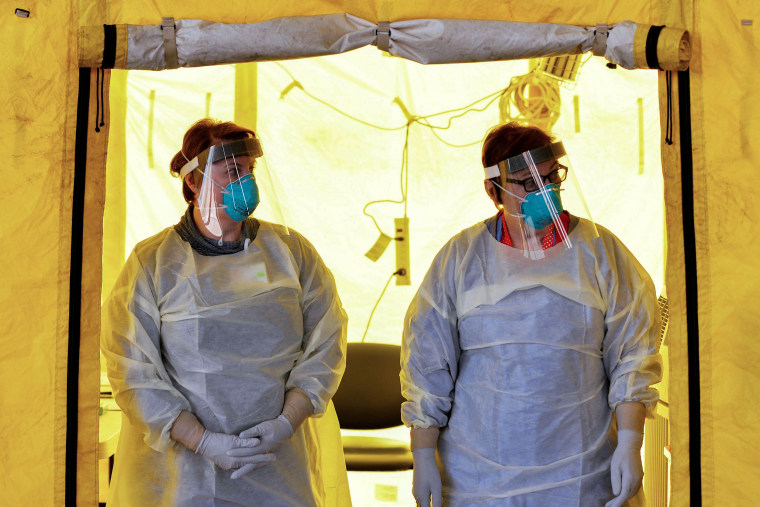WASHINGTON — U.S. hospitals and medical professionals are asking for $100 billion in direct financial assistance from Congress to respond to the coronavirus pandemic, with some hospitals already running short of supplies for both patients and health care workers in virus hot spots like Seattle.
In its initial legislative package, Congress appropriated funding to assist hospitals with more bed space and medical supplies, but it did not create a direct pipeline to address urgently needed supplies and equipment such as masks, ventilators and personal protective equipment for front-line health care workers.
After a second spending bill without direct payments was signed into law by President Donald Trump on Wednesday, the American Hospital Association cautioned congressional leaders in a statement that “more needs to be urgently done.” That package expands sick leave and makes testing for the coronavirus more widely available.
On Thursday, the association dramatically expanded its earlier request from $1 billion to $100 billion for direct funding for hospitals, the group told NBC News.
In a joint letter to congressional leaders, the American Hospital Association, the American Medical Association and the American Nurses Association write: “Based on the initial costs in the states with growing COVID-19 community spread, Congress should allocate $100 billion to front line health care personnel and providers, including physicians, nurses, hospitals and health systems, and direct the federal agencies to begin to infuse funds immediately so that they can afford to take the necessary steps to fight the battle against this unseen enemy.”
House Speaker Nancy Pelosi, D-Calif., on Thursday also called on Trump to immediately activate the 1950 Defense Production Act, which allows him to direct American manufacturers to produce urgently needed supplies. After saying in a Wednesday press conference that he would use the powers, the president later said in a tweet that he will only “invoke it in a worst case scenario in the future.”
The hospital association says Trump needs to invoke his powers quickly in order to speed production and distribution of the supplies they need to treat patients and keep health care workers safe. The new legislation would then allow hospitals to purchase whatever new products are created by American manufacturers.
The federal government has traditionally funneled money to hospitals through various agencies and state entities, a process that takes too long and doesn’t guarantee hospitals are getting what they need, the association said, particularly in rural hospitals.
Even after receiving two supply shipments from the Strategic National Stockpile, some hospitals in Washington state are already running low on supplies, putting health care workers at risk and forcing hospitals to make difficult decisions, including one rural hospital that’s already closed down primary care services to conserve supplies, Washington State Hospital Association spokeswoman Beth Zborowski said.
“We’re getting to a real dire position here with some hospitals having only a few days' worth of masks on hand,” she said.
It’s unclear how funds designated for hospital readiness from the initial congressional package will get distributed to hospitals most in need, Zborowski added. Some of the money runs through a Department of Health and Human Services emergency fund, and it’s unclear what mechanism HHS will use to disburse it and who will get it, for instance.
On March 16, a joint letter from the same groups asked for $1 billion to ensure that “hospitals, health systems, physicians and nurses are viable and directly supported for preparedness and response.”
Congress and the Trump administration, in their public remarks, have appeared to focus more on the need for a broader stimulus proposal than what medical professionals say is the immediate challenge of personal protective equipment shortages and ventilator production. Hospital officials say they believe their message is being heard on Capitol Hill, yet there are no promises on funding levels or timing.
The White House is proposing a $1 trillion economic package to combat the fallout from the coronavirus outbreak, $250 billion of which would be used for direct payments to Americans. Senate Majority Leader Mitch McConnell, R-Ky., has outlined three broad buckets, including helping small businesses, “Main Street” and the “health care system and medical professionals,” without offering specifics. Secretary of the Treasury Steven Mnuchin has been negotiating directly with Pelosi.
Josh Michaud, an associate director for global health policy at the Kaiser Family Foundation, said there’s a disconnect between what Congress is prioritizing and what hospitals are saying they need to combat the pandemic. “We’re already starting to see concerns that certain hospitals will be running out in the next couple days. The efforts so far to address this have been slow,” he said. Kaiser is a nonpartisan nonprofit health policy group.
The Washington state rural hospital that cut off primary care services has one box of masks left, Zborowski said.
The bottleneck is due to hospitals not getting as much as they normally ordered from suppliers because of a worldwide shortage. Further, almost all of the hospitals in the Seattle area are canceling elective surgeries that bring in revenue that keeps hospitals financially sound, she said.
On Wednesday, New York Gov. Andrew Cuomo wheeled in a ventilator to a news conference to make his point: “We need ventilators,” he said. “This is a national need. Every state across the country needs them,” he said.

